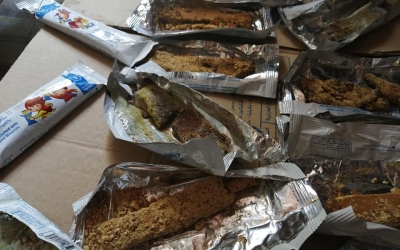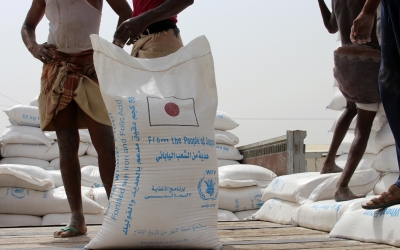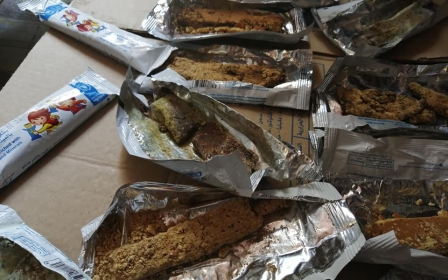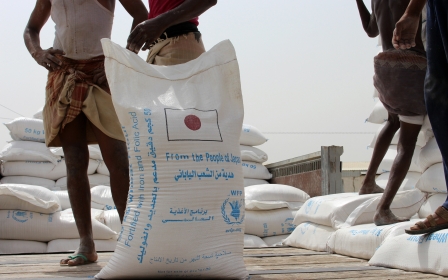Yemen government supporters turn on UN, claiming it imported rotten food aid
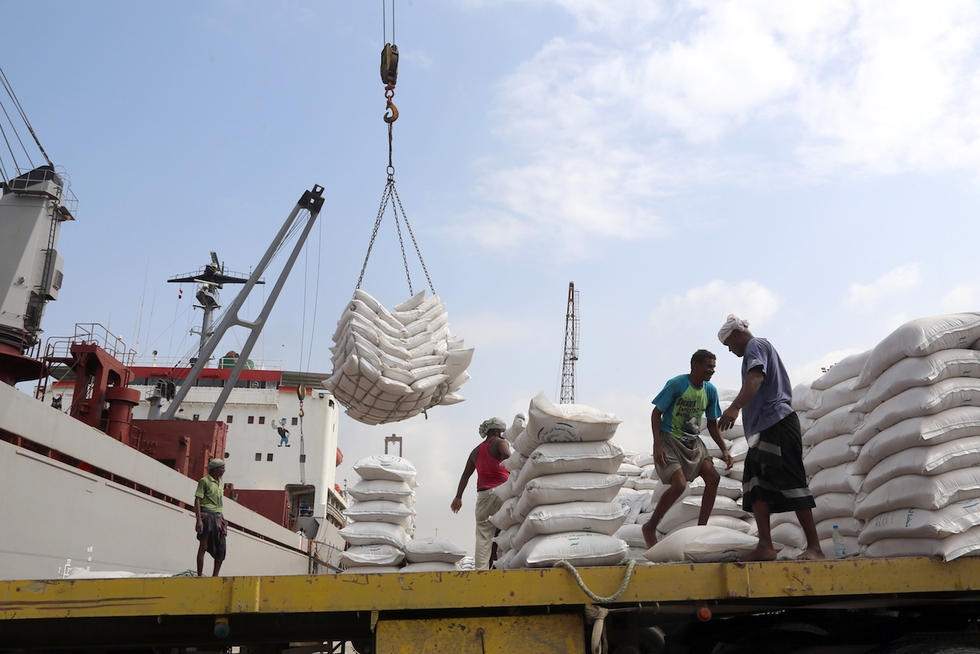
The issue of rotten food aid has taken centre stage in Yemen after the United Nations spoke out against the decision by the outgoing Trump administration to designate rebel Houthis as a "foreign terrorist organisation" (FTO).
Houthi authorities have long accused the UN of sending rotten food to Yemen over the last five years, while the UN's World Food Programme (WFP) has denied the accusations.
Until now, pro-government activists, politicians and officials had supported the UN against the Houthis' accusations but following the UN's call for the ending of the FTP designation those forces are now taking aim at the UN.
'It is impossible to have a zero percent damage rate when handling a delicate commodity like food, particularly in an active war zone'
- World Food Programme spokesperson
Since 2015, those same forces had been happy to accuse the Houthis of looting aid and allowing the distribution of rotten aid, as well as accusing them of creating obstacles for organisations such as the WFP to distribute food.
However, Yemen's government has been calling for the FTO designation of the Houthis for years and it has been outraged by the UN and other bodies' response.
New MEE newsletter: Jerusalem Dispatch
Sign up to get the latest insights and analysis on Israel-Palestine, alongside Turkey Unpacked and other MEE newsletters
As a result, some pro-government journalists have started publishing documents which they say prove that UN agencies have been deliberately importing rotten aid and passing it on to needy people in Yemen.
Others have claimed that large quantities of aid have been damaged after remaining for long periods of time in UN warehouses.
Leaked documents revealed by the pro-government journalist Baseem al-Jenani state that tonnes of rotten food were imported to the port of Hodeidah and then distributed to people in Houthi-controlled areas.
In one of his tweets about the claims, Jenani said that: “181 containers of rotten peas imported by WFP are waiting to fumigation in Al-Hodeida seaport to be sent and distributed to people. The Authority for Standardisation and Metrology has already reported this isn’t valid for human beings and it should be re-exported.”
'Biased UN'
A source in the information ministry in Aden, the current base of the government, told Middle East Eye that UN agencies were supporting the Houthis “in one way or another” and that they were both involved in the damage to aid in the northern provinces.
“During the last few years, we believed the UN when they said that the Houthi militias hindered their access so aid remained for months in the warehouses until it expired,” said the source, who spoke on condition of anonymity for security reasons.
“However, recently we realised that the UN agencies insist on importing the aid to Hodeidah seaport which is under the control of the militia, and this is suspicious.
"Moreover, the UN defends the Houthis, calling the US to revoke the [FTO] designation.”
He added that while UN agencies had accused the Houthis of being behind damage to the aid in the warehouses, the UN was against any restrictions on the Houthis.
“Rotten aid was distributed and disposed of many a time in Yemen, and we thought it was the Houthis who did it, but today we saw documents proving that the UN imported rotten aid,” said the source.
He said that the UN does not dare tell the truth about what is happening in Yemen and so “no solution will come through the biased UN in Yemen”.
“If the UN believes that importing aid through Hodeidah seaport takes a long time, they can import their aid through Aden seaport, but they don’t do that, and instead insist on dealing with the Houthis who are designated as an FTO by the US.”
'Wheat flour with insects'
Those living in northern provinces say they have witnessed the disposal of food and sometimes this has happened after months of the food aid being kept in UN or international aid organisation warehouses, but they do not know why the aid has rotted.
Ahmed Qasem, a resident of Hodeidah province, told MEE: “We received wheat flour with insects, but that’s fine and we took away the insects and ate it. We don’t throw away any food we receive.”
Qasem said that he was receiving less aid nowadays, and that the last time they had received any food with insects in had been around a year and a half ago.
“Nowadays, we don’t receive wheat flour with insects but we hear about damage to that food," he said.
"The food remains for months in the warehouses and is then sent for disposal.
"We hope to receive it, even with insects, instead of it being thrown away.”
Most Yemenis do not throw away any food, and even the food unsuitable for humans is given to livestock.
Rotten date bars
The latest allegations are not the first time that the UN has been accused of distributing food unfit for consumption.
In 2019, date bars distributed by the WFP by its School Feeding Programme were found for the second year in a row to have rotted, some with weevils inside.
According to their expiry date the bars should have been ok but school principals reported that was not the case.
The WFP said that upon being informed of the issue in early November 2019, the agency had stopped its School Feeding Programme as a precaution and launched an investigation.
“Our preliminary findings suggest the problem lies with the packaging of the date bars,” a spokesperson told MEE at the time, adding that the WFP was recalling the date bars and would soon start delivering "fresh stock from different production batches”.
In the same year, 51,000 tonnes of wheat being held at Hodeidah port was reported first as inaccessible due to fighting in the port city between the Houthis and the Saudi-led coalition that supports the government.
There were also reports that the wheat had been infested by weevils and that much of it was rotten.
However, the UN later confirmed to MEE that much of the grain was still fit to eat and needed to be fumigated.
Call to improve permits process
With 70 percent of all imports and 80 percent of all humanitarian assistance passing through the ports of Hodeidah and Salif, they are critical to commercial and humanitarian activities in Yemen.
A source in the Authority for Standardisation and Metrology in Hodeidah told MEE that ships usually take a long time to get permits from the UN Verification and Inspection Mechanism for Yemen (UNVIM) in Djibouti before embarking and they faced further delays offloading at Hodeida.
'Some food aid is damaged because of the poor storage as the journey of the ships to arrive at Hodeida port is long so they arrive as rotten food that can’t be eaten by human beings'
- source at Authority for Standardisation and Metrology, Hodeidah
“Some food aid is damaged because of the poor storage as the journey of the ships to arrive at Hodeida port is long so they arrive as rotten food that can’t be eaten by human beings,” he said.
The source, who did not wish to be identified, stated that the authority prepares reports on all shipments that arrive in Hodeidah, including the condition of the food, but sometimes the UN does not re-export the rotten food and disposes of it in Yemen.
“The journey of exporting and re-exporting takes time, so usually the UN prefers to leave the damaged shipments in Yemen and this is what usually happens,” he added.
“There are some shipments of food that arrive rotten but actually this is because the UN is importing such huge quantities of food.”
The source said the solution to the problem was improving the process of getting permits from the UNVIM in Djibouti and making sure ships did not remain for months at sea before arriving at Hodeidah.
“We are at war and the movement of ships isn’t like normal times so both the UN and traders lose some quantities of food during importing," said the source.
"When we recommend re-exporting, that means the food is invalid and we don’t want Yemen to pay for the cost of that food.”
The source said that although sometimes the food aid arrived in a good state it remained either for a long time or in bad storage in the warehouses and therefore rotted.
“There are several factors standing behind the damage to the aid and one of them is that they stay for a long time in warehouses until they expire,” the source added.
'Delicate commodity'
A WFP spokesperson told MEE that the documents shared on social media by pro-government supporters regarding food unfit for consumption relate to various cases of small quantities of food damaged during shipment or transport over the last three years.
“No food had expired at the time of import,” said the spokesperson, who asked not to be named.
She also pointed out that the food can be damaged for different reasons, including delays in distribution or access to warehouses.
“In 2020, less than one percent of WFP food assistance in Yemen was damaged during delivery and disposed of," said the spokesperson.
"The low damage rate demonstrates that the WFP successfully mitigates against these challenges.
"It is impossible to have a zero percent damage rate when handling a delicate commodity like food, particularly in an active war zone,” she added.
The spokesperson said that any damaged food assistance is immediately segregated from the good stock and replaced, adding this was done in full coordination with the relevant authorities.
“Unfortunately, this process takes on average six months – time that would be better spent serving the vulnerable families who rely on WFP food assistance for survival,” she added.
Middle East Eye delivers independent and unrivalled coverage and analysis of the Middle East, North Africa and beyond. To learn more about republishing this content and the associated fees, please fill out this form. More about MEE can be found here.



